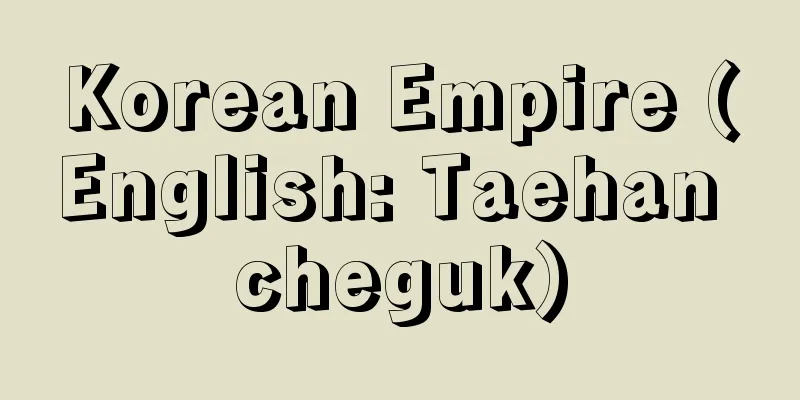Korean Empire (English: Taehan cheguk)

|
The name of the country was changed from the Joseon Dynasty in October 1897, under the reign of King Gojong of the Joseon Dynasty (Yi Dynasty). It was abolished in 1910 by Japan's "annexation". The reason for the change in the name is said to be the recommendation of a close aide who decided that the vassal relationship with the Qing Dynasty had also ended with the Sino-Japanese Peace Treaty. The title of king was considered a symbol of Qing, and the honorific title of emperor and the Gwangmu era name were established, as in both Japan and Qing. The political and economic structures were not changed, and the Joseon Dynasty continued as it was, but the spirit of independence did not weaken, and even under Japanese rule, the name Korea was used as a sign of resistance, and the provisional government formed after the March 1st Movement was called the "Provisional Government of the Republic of Korea". This empire lasted for 14 years under two generations of King Gojong and Sunjong, but after the Russo-Japanese War, it became a pro-Japanese government, and it was a period when independence became increasingly distant. In other words, the signing of the Japan-Korea Protocol in 1904 forced Korea to cooperate with Japan and be hostile towards Russia, and the following year, the Protectorate Treaty established a Residency-General, resulting in Korea losing real power in both domestic and international politics and being effectively "annexed." When the emperor abdicated in the Hague Secret Envoy Affair, Korea was eventually "annexed" by Japan. Meanwhile, the independence movement was intense, and anti-Japanese independence voices grew widely among the people, including righteous armies, peasant independence struggles, and patriotic enlightenment movements by aristocrats and intellectuals, but they were suppressed by the powerful Japanese military. Source: Encyclopaedia Britannica Concise Encyclopedia About Encyclopaedia Britannica Concise Encyclopedia Information |
|
朝鮮,朝鮮王朝 (李朝) の高宗 34 (1897) 年 10月以後,朝鮮王朝を改称した国号。 1910年日本の「併合」によって消滅した。国号変更の動機は,日清和平条約により清朝との宗属関係も消滅したと判断した近臣のすすめによるものといわれる。これまでの王の称号は清に付属した印であるとして,日,清両国のように皇帝の尊称,光武年号の制定などをみた。政治・経済機構は変更されず,そのまま朝鮮王朝の状況が続いたが,その独立の意気は衰えず,日本統治下でも,大韓を名のることで抵抗のしるしとし,三・一運動後,組織された臨時政府は「大韓民国臨時政府」と名のった。この帝国は,高宗,純宗と2代 14年間にわたったが,日露戦争を境に親日派政権になり,ますます独立から遠ざかった期間であった。すなわち,04年の日韓議定書調印により対日協力,対露敵対を強いられ,翌年には「保護条約」によって統監府を設置されるなど,内外政治ともに実権を失い,事実上の「併合」下におかれた。ハーグ密使事件で皇帝が譲位すると,やがて日本に「併合」されるにいたった。一方,独立運動も激しく,義兵,農民の独立闘争や貴族,知識人による愛国啓蒙運動など,広く国民の間に反日独立の声が高まったが,強力な日本軍隊に弾圧された。
出典 ブリタニカ国際大百科事典 小項目事典ブリタニカ国際大百科事典 小項目事典について 情報 |
Recommend
Border
…The border area between England and Scotland, a ...
Tosotsuten
One of the heavens in the Buddhist worldview. It ...
Polish Brotherhood - Bracia polscy
A reformed sect that emerged in Poland as a result...
False -
…If you make an employee work on a holiday while ...
Securities company - shokengaisha
Article 29 of the Financial Instruments and Excha...
Alexander the Great - Alexander
King of Macedonia (reigned 336-323 BC). Son of Phi...
Dry-distilled charcoal - Kanryutan
…The carbonization of wood for the primary purpos...
Acne
A colloquial name for acne vulgaris, it is an inf...
Zudabukuro - Zudabukuro
〘Noun〙① A bag worn around the neck by a monk who p...
Japanese carpenter bee (Xylocopa appendiculata)
An insect of the Hymenoptera family, Apidae (illus...
Western harp
A Chinese zither-like percussion instrument. It i...
gonochorism
…In plants, this phenomenon is called monoeciousn...
Periphery wall
...Depending on what is being considered, the wor...
Mudéjar (English spelling)
The term is a Spanish corruption of the Arabic mud...
Kyokuroku -
A type of chair used primarily by Buddhist monks....









